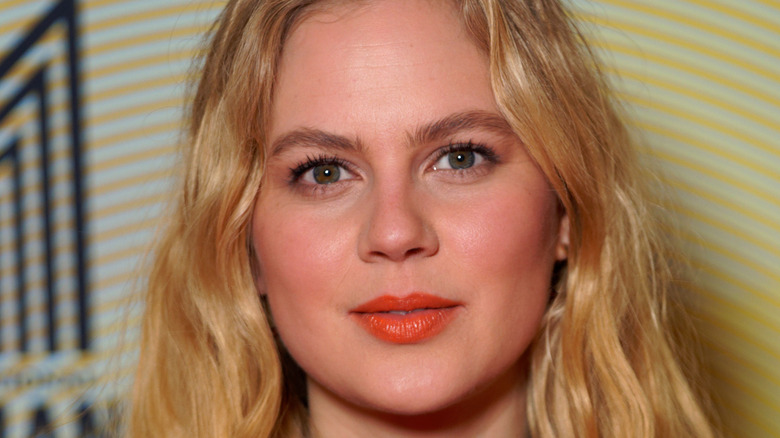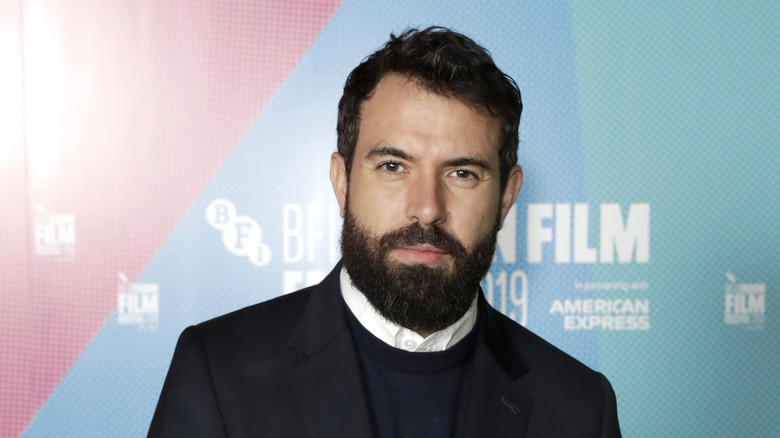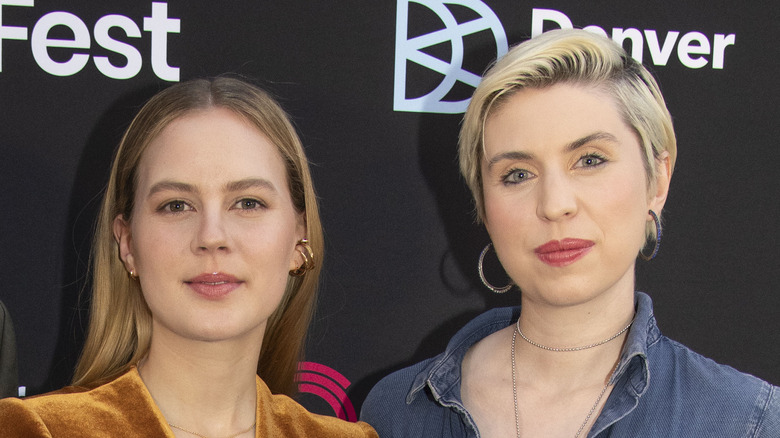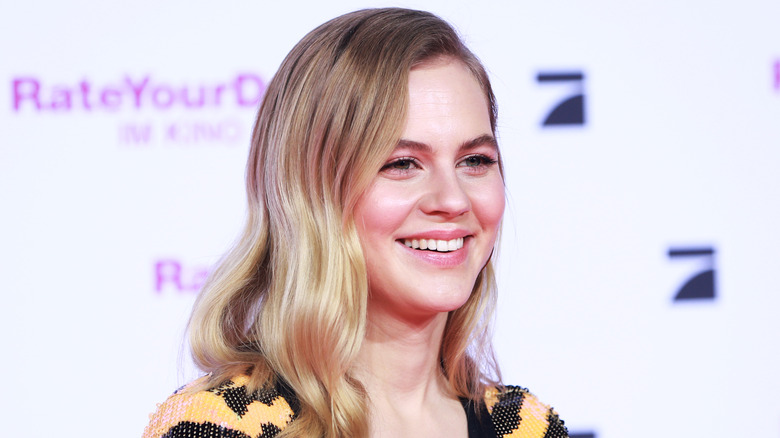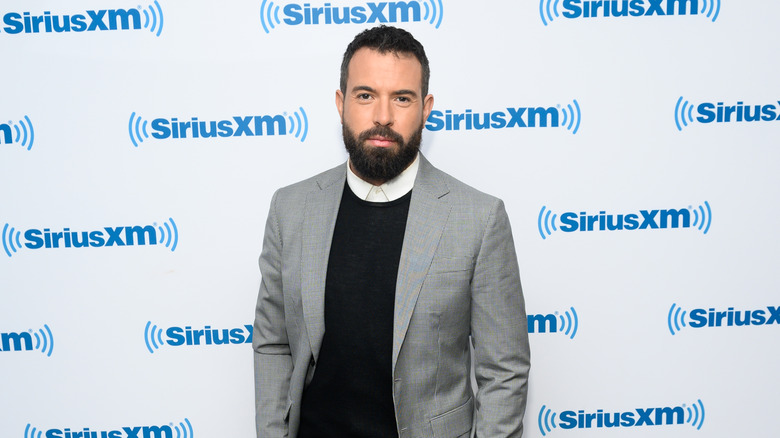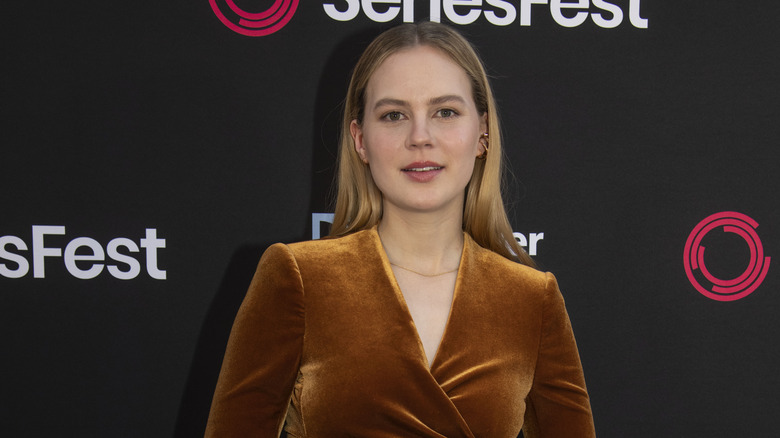Becoming Elizabeth's Alicia Von Rittberg And Tom Cullen On Their New Series - Exclusive Interview
To say that the historic worlds of "The Crown," "The Gilded Age," and "The Great" have taken a hold on viewers near and far is a significant understatement, and the genre is about to welcome a brand new series to the mix: "Becoming Elizabeth."
Starring Alicia von Rittberg in the titular role of Elizabeth Tudor — before she was the queen of England — "Becoming Elizabeth" has everything a historic drama should have: salacious love stories, family dynamics that leave you furious and hungry for answers, unforeseen twists and turns, and immaculate writing to draw you in. What sets the show apart, however, might be the contemporary issues of feminism and sexual politics interwoven throughout a largely historical series. What "Becoming Elizabeth" does so well is that it retells an age-old story in a fresh, dynamic, and provocative way.
We hope we've sold you on the show, expertly crafted by writer Anya Reiss, because it hits STARZ on June 12. Luckily for us (and you), we got to sit down with von Rittberg and co-star Tom Cullen ahead of the premiere, and the two of them dished about the show, their characters, and the unforeseen twists in each episode. Cullen brings to life the tortured Thomas Seymour, who is central to Elizabeth's romantic development, and the dynamic between the two actors was lovely, respectful, and left us craving more answers.
Alicia and Tom reveal what initially attracted them to Becoming Elizabeth
I'd love to know what initially attracted you to this project. It's about power, this historical tale, and this new perspective on a story that a lot of us think we know. What initially attracted you, and what were your reactions to the episodic scripts?
Alicia von Rittberg: It's being allowed to have a look behind the curtains. Whenever you look at history, I wonder who those people actually are, apart from those icons we know from books. In order to do so, there is no better way than going back to their youth. The way Anya Reiss wrote the scripts was so close to the characters, those relationships, the rawness, the reality ... There is no black and white. She never forgot that they were family, no matter how difficult it must have been.
The humans behind those public figures that we know from the books, and to make them palpable and relatable — that was what made me fall in love with the project.
Tom Cullen: I agree with what Alicia said. When I first read the scripts, I was blown away by the writing — by how funny it was, how well observed, and how I hadn't seen a period drama written like this before. It felt so contemporary and so relatable. I know that's such a boring, cliché thing that everyone says when they do press for period dramas, but it's absolutely true.
What Anya's done so well is that she's really zoomed in on the characters. It's a show about a royal family, but it's not. It's a show about a complex family in the same way that "Succession" is. It's actually about relationships. That's definitely what the show is about.
At its core, it has a storyline that shocked me, and [it's] something that I didn't know about Elizabeth's history but also something that is very much in the zeitgeist and definitely needs to be talked about. [It's] something that I actually haven't seen that well talked about. The show is about a young woman finding her place in the world and amongst a lot of very, very powerful men who are manipulating and using her as a tool and a pawn in their game.
I read that and I was, "Oh, s**t. This is a really important story." If you strip everything else away, [it's] a story that I hadn't necessarily seen told with such complexity and nuance. As Alicia said, the characters ... there's no black and white. Everything is very gray. No one's a hero. Everyone's a villain. But everyone's everything all at once, just like humans. That's what blew me away when I first read it.
The actors were taken by writer Anya Reiss' compelling work
Working with a screenwriter like Anya Reiss and the likes of George Ormond, who's done "National Treasure," "Great Expectations" — that must have been exhilarating on its own. Could you take me back to that filming experience and what that collaborative dynamic was like?
Cullen: When I first met Anya, I hadn't met her before. I knew her work, [and] knew some friends that knew her and said she was amazing. I also knew that she was 28 when she wrote this. And was she 29 when she was show-running, Alicia?
von Rittberg: Yes.
Cullen: Actually, she might have been 26 when she started this. What a brain. She's this really rough-and-tumble woman from Brixton. The first time I met her, she was wearing this all Adidas tracksuit. And I was, "Who's this ball of energy?" I thought that maybe it was a runner or something, but it was Anya, and I'd met her. Instantly, I was blown away by her speed of thought.
The show is very much a reflection of her. She's punky. She's got this incredible, fierce female energy, and [the show] is so female. That's what's so exciting about this show ... It's happening more and more. We've spent so much time watching shows and films that are through a male gaze, but this is so inherently a female gaze.
In some ways, this show is about a young woman. [Anya] started writing when she was 17, 18. She had her first play at the Royal Court — which for my money is the best theater in the U.K. — when she was 18. It's a show about Anya's struggle and fight to have recognition in a very male-dominated world, which is theater. Elizabeth is Anya in many ways. To work that closely with her was thrilling.
von Rittberg: It was definitely the same for me. When they started working together — George and Anya — I think George approached Anya and Anya was, "I don't watch period dramas myself, so I don't know what to do with this." And he was, "Well, why don't you write a period drama that you would want to watch yourself?" And that says basically everything.
Then we started filming, and we always said, "This is something that should work without the costumes and without the amazing locations." This is something that is so close to the characters, such a psychological piece, that everything else around it is basically a beautiful add-on. That is what we kept on coming back to. It was absolutely special and amazing to work with them.
Alicia reflects on her character's inner voice and on-screen conflict
Alicia, for you, a vital cornerstone of the series is Elizabeth's internal battle; a younger brother taking power, dictating her life; marriage and duties. How did you prepare to take on such a dynamic role, and how did it challenge you as an actor and also as a woman?
von Rittberg: What I tried to do, looking at Elizabeth, is try to find the right voice for it. That was something that's very important. What I did not want to do is try to find a male way of leading. That is still very predominant nowadays. What we, as a society, have to learn is to accept a more vulnerable, softer way of female leaders rather than trying to make them something they are not, and seeing the power and strength behind that.
Funnily enough, I was very inspired by an interview by Lady Diana because she was so soft and vulnerable and yet so respected. I wanted to give [Elizabeth] something like that. I wanted her to be emotional, vulnerable — someone who's not like with the head through the wall, but also someone who's observing and learning, and then choosing her fights wisely and being agile as well. Because at the time, it was incredibly dangerous. Every wrong decision could mean your head on a spike. Daring to take yourself back — knowing that she will be one of the greatest leaders — and find your soft voice to gain some respect, that was the most difficult thing I concentrated on preparing.
Tom's take on his complex character in Becoming Elizabeth
Considering your dynamic as characters, you share this rather sordid dynamic. With your character, Tom, casting his desires onto the young Elizabeth, can I get your take on that very pivotal character development that could be received by audiences in a number of nuanced ways?
Cullen: You said it — it's nuanced, and it's complex. [Their] dynamic is that. I was very surprised and blown away by that part of the story, because that was a part of the history that I was kind of familiar with, but actually not at all. It felt very contemporary and very important.
Personally, I had to have a very specific viewpoint on it, which was that Thomas, my character, is the hero of the story and that everything that he does is just and right and defendable. That was the only way I could play him without any kind of judgment. I didn't want him to be a bad guy. I wanted him to be a human being. I wanted the audience to like him, and I wanted the audience to be seduced by him — so then, when the tables are turned, for the audience to be as conflicted and confused as Elizabeth is.
That's what that dynamic is. It's confusing. And let's not beat around the bush — I'm not defending him. He is a powerful man who is using Elizabeth, arguably. But I also think that he did love her, so that's where the complexity comes in.
Alicia and Tom reflect on the nuanced nature of Becoming Elizabeth
When we think about royal dramas, I think of "The Crown" or "The Gilded Age"; even the film "Mary Queen of Scots" reminds me a bit of this piece. So much of what we witness is a retelling of history. But with a show like this, we get additional layers. We get these additional themes that we're not necessarily presented with in a history book or in a classroom: the intricacies of feminism, desire, war, etc. We've touched on it a little bit, but could you tell me a little about the complexity of your characters when they're navigating life in conflict?
von Rittberg: Well, for Elizabeth, it is that. She has probably grown beyond her years. She's very mature, but because she needed to be. She grew up without a mother and lost her father. She fell in and out of favor, basically. One day, she's in line for the throne, and one day she's an orphan. She is used to navigating wisely — observing, learning, not jumping to any conclusions, and holding her wants and needs back.
That's what is so painful to see as well, because when it comes to love, she's a young woman who wants to fall in love for the first time and experience love for the first time, to be a normal young woman for once. Seeing that taken away from her is incredibly painful. That's where the gray, the no black and white, comes in, because you can only be strong to a certain extent. At some point, you will break.
There was such a pivotal line I pulled out: "The hunter is not the lion but the lioness." That was so poignant in that kind of character development, which we don't see often.
von Rittberg: Yes. I think it is ... "The hunter is not the lion." Who said that? Tom, did you say that?
No, I don't think it was Tom.
Cullen: No, Thomas isn't smart enough to say something so poetic and well-observed as that.
von Rittberg: In order to survive, you have to play by the rules. But it's difficult to follow who is the person who's making the rules at the moment.
"Becoming Elizabeth" will debut on Sunday, June 12 at 9:00 pm ET/PT on STARZ.
This interview was edited for clarity.
